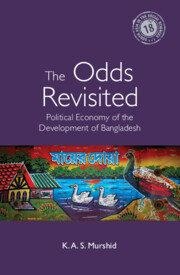
- Publisher:
- Cambridge University Press
- Online publication date:
- June 2022
- Print publication year:
- 2022
- Online ISBN:
- 9781009128230

This book looks at Bangladesh at and beyond its fifty years since its formation in 1971. A comprehensive, holistic narrative is constructed to track key development dynamics at the sectoral, sub-sectoral and macro levels. This much-needed exercise dispels the notion that the 'Bangladesh surprise' can be reduced to singular dimensions such as the trauma of the 1971 war or women's empowerment and micro-credit. The mixture of economic history, political economy and institutional and actor analysis provide fresh insights to the themes addressed. A well-argued case to view emerging Bangladesh as the newest member of the Flying Geese club, The Odds Revisited includes a detailed review of macro and sectoral developments over the last fifty years and provides new material and insights into the rise of Bangladesh's capitalist class; a socio-economic perspective of the role of Dhaka-based urbanization; and the rise of a new middle class.
‘The Odds Revisited is an attempt to unravel Bangladesh's complex development story. The breadth, scope, and analytical depth of the book provide the reader with an engaging, comprehensive treatment of a difficult, complex journey. The book begins with the premise that interventions in food and family planning laid the foundation for future development, initially in social outcomes which subsequently prepared Bangladesh to tap into global opportunities in the form of export-led growth and remittance earnings. Where the book breaks new ground is in its reassessment of the social sector, as well as a fresh analysis of Bangladesh's industrialisation experience that goes well beyond the RMG. The other important addition is its treatment of Dhaka's mega transformation. This is a comprehensive book to have on hand for occasional browsing, or for serious diving into it, for development scholars and for anyone interested in Bangladesh and South Asia.'
Muhammad Yunus - Founder, Grameen Bank
‘Look no further for a comprehensive account of Bangladesh's rapid structural transformation against ‘the odds' from a disaster-prone agrarian nation wrecked by conflict, exploited and dominated by outside interests to an industrialising and exceptional ‘flying goose' whose poverty has dramatically declined. Responding to the singularity of previous attempts to explain this remarkable trajectory, ‘The Odds' develops a holistic method in political economy grounded in transformations to the rural material base, their repercussions and their spatial and sectoral multipliers. In so doing, it covers a range of theoretical arguments, debates and contentions in social science, mobilises rich empirical detail, spans a wide range of institutions, and does not flinch from tackling the international relations of development or domestic authoritarianism and corruption. Dr Murshid's fine history of the present is an essential text, one relevant not just to economists of Bangladesh but to scholars, whatever their parent discipline and their regional focus, concerned with the surmounting of rooted and intransigent development problems from the past and the prospects for resolving present and future ones.'
Barbara Harriss-White - University of Oxford
‘Captures the development puzzle of Bangladesh through a comprehensive, jargon-free, account of its political economy over the last fifty years of its liberation from a near standing start in 1971. While acknowledging ongoing problems of governance, democracy and inequality, it tracks a broadly supportive state facilitating both agricultural and industrial growth especially in the garments sector, alongside remittances from overseas. It compares this dynamically changing country favourably with its South Asian neighbours, while looking to inspiration from East Asian trajectories. An insightful ‘must read' not only about Bangladesh, but also a model for analysing lower middle income societies needing to move their economies to the next level in pursuit of human and social needs. A well evidenced, authoritative, interdisciplinary triumph which celebrates the agency of his people.'
Geof Wood - University of Bath
‘Bangladesh is widely seen as a success story in economic and social development, making significant progress both in increasing the living standards of its citizens and in social outcomes such as in family planning, health, primary education and women's empowerment. What explains these remarkable achievements, given the large disadvantages that Bangladesh faced at independence in 1971? K. A. S. Murshid provides an insightful account of the factors that contributed to Bangladesh's success, weaving a historical reading of Bangladesh's experience, with in-depth data analysis. The book is a must-read for scholars and practitioners interested in understanding how a poor developing country could surmount the numerous challenges it faced at the beginning of its development path.'
Kunal Sen - University of Manchester
 Loading metrics...
Loading metrics...
* Views captured on Cambridge Core between #date#. This data will be updated every 24 hours.
Usage data cannot currently be displayed.